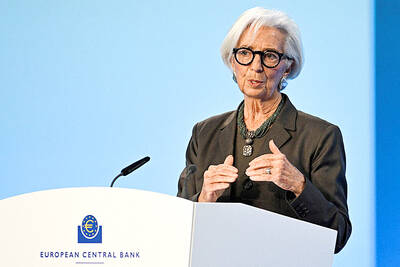Retail sales last month plunged at the steepest pace on record at 13.3 percent annually to NT$266.4 billion (US$9.5 billion), as consumers cut spending amid a nationwide level 3 COVID-19 alert, with restaurant and beverage sales posting an annual decline of 39.9 percent, Ministry of Economic Affairs statistics showed yesterday.
With COVID-19 restrictions remaining in place this month, the ministry expects retail sales to contract at an even faster rate of 19 to 22 percent annually, while restaurant and beverage sales are forecast to dip by 43 to 49 percent.
“As the whole month of June was spent under the level 3 alert, people avoided going out to shop,” Department of Statistics Deputy Director-General Huang Wei-jie (黃偉傑) said. “This inevitably led to a substantial drop in shoppers.”

Photo: Fang Pin-chao, Taipei Times
Clothing store sales dropped 53.9 percent year-on-year last month, and department store sales plunged 64.7 percent, ministry data showed.
Sales at convenience stores slid 7.4 percent, but online shopping benefited, advancing 33.7 percent, the data showed.
Supermarket sales also rose 33.2 percent as people consolidated their shopping to minimize time spent outside.
“The only business that bucked the trend is certain Western-style eateries that came out with promotional offers,” Huang said.
For the first half of the year, retail sales increased 5.8 percent annually to NT$1.92 trillion, supported by annual sales growth of 25.7 percent from virtual stores.
Restaurant sales fell 1.4 percent annually to NT$361.5 billion during the same period.
Meanwhile, wholesale revenue grew 18.2 percent year-on-year to NT$987.3 billion last month, marking the best June figure on record.
Machinery equipment sales expanded 23.1 percent to a record NT$428.6 billion, while construction material sales grew at the fastest pace in the wholesale segment at 45.6 percent to NT$122.3 billion, a June record.
For the first six months of the year, wholesale revenue increased 18.4 percent year-on-year to NT$5.83 trillion, ministry data showed.
The ministry expects wholesale revenue to increase by another 7 to 10 percent this month.
The ministry also released data showing that industrial production expanded 18.37 percent year-on-year last month.
Manufacturing production, which accounts for more than 90 percent of the total industrial production, expanded 20.2 percent last month, thanks to strong demand for chips used in 5G-related and high-performance computing devices and the stay-at-home economy boosting demand for LCD panels, the ministry said.
Last month’s manufacturing production expanded for the 17th consecutive month, it said.
In the first half of this year, industrial production rose 14.62 percent from a year earlier, while manufacturing output was up 15.66 percent, the ministry said, adding that the growth momentum is expected to extend into this month.

European Central Bank (ECB) President Christine Lagarde is expected to step down from her role before her eight-year term ends in October next year, the Financial Times reported. Lagarde wants to leave before the French presidential election in April next year, which would allow French President Emmanuel Macron and German Chancellor Friedrich Merz to find her replacement together, the report said, citing an unidentified person familiar with her thoughts on the matter. It is not clear yet when she might exit, the report said. “President Lagarde is totally focused on her mission and has not taken any decision regarding the end of

French President Emmanuel Macron told a global artificial intelligence (AI) summit in India yesterday he was determined to ensure safe oversight of the fast-evolving technology. The EU has led the way for global regulation with its Artificial Intelligence Act, which was adopted in 2024 and is coming into force in phases. “We are determined to continue to shape the rules of the game... with our allies such as India,” Macron said in New Delhi. “Europe is not blindly focused on regulation — Europe is a space for innovation and investment, but it is a safe space.” The AI Impact Summit is the fourth

CONFUSION: Taiwan, Japan and other big exporters are cautiously monitoring the situation, while analysts said more Trump responses ate likely after his loss in court US trading partners in Asia started weighing fresh uncertainties yesterday after President Donald Trump vowed to impose a new tariff on imports, hours after the Supreme Court struck down many of the sweeping levies he used to launch a global trade war. The court’s ruling invalidated a number of tariffs that the Trump administration had imposed on Asian export powerhouses from China and South Korea to Japan and Taiwan, the world’s largest chip maker and a key player in tech supply chains. Within hours, Trump said he would impose a new 10 percent duty on US imports from all countries starting on

STRATEGIC ALLIANCE: The initiative is aimed at protecting semiconductor supply chain resilience to reduce dependence on China-dominated manufacturing hubs India yesterday joined a US-led initiative to strengthen technology cooperation among strategic allies in a move that underscores the nations’ warming ties after a brief strain over New Delhi’s unabated purchase of discounted Russian oil. The decision aligns India closely with Washington’s efforts to build secure supply chains for semiconductors, advanced manufacturing and critical technologies at a time when geopolitical competition with China is intensifying. It also signals a reset in relations following friction over energy trade and tariffs. Nations that have joined the Pax Silica framework include Japan, South Korea, the UK and Israel. “Pax Silica will be a group of nations